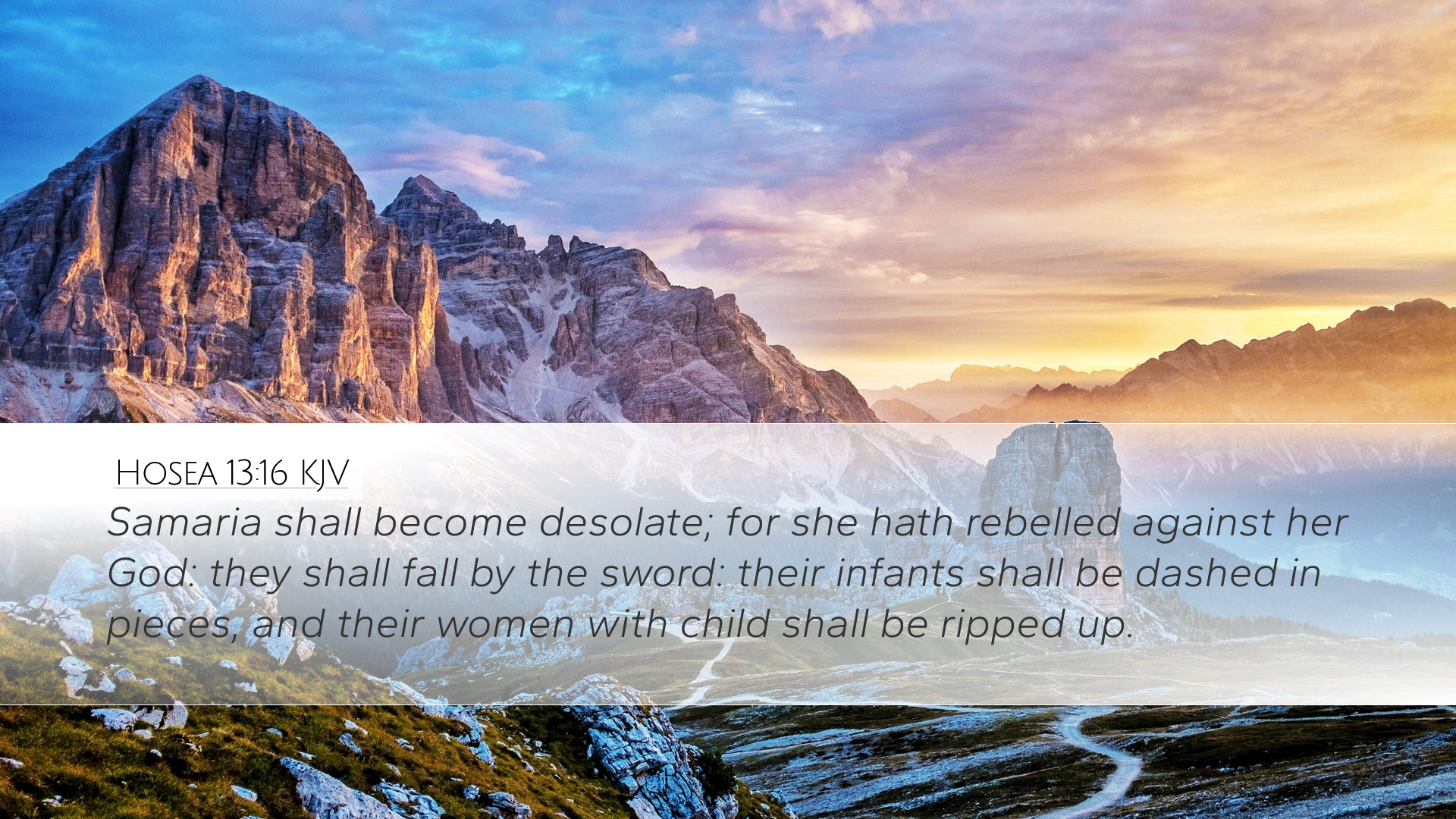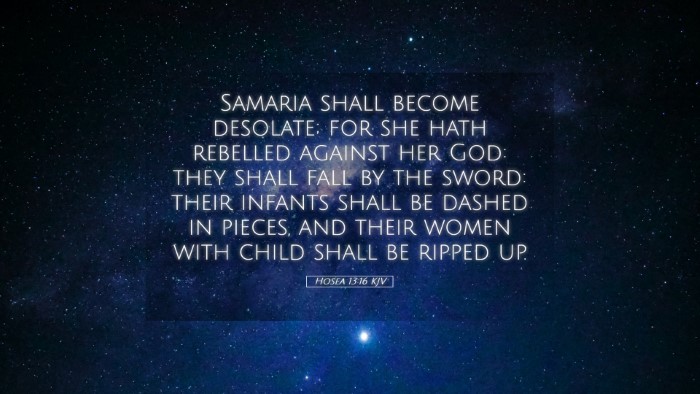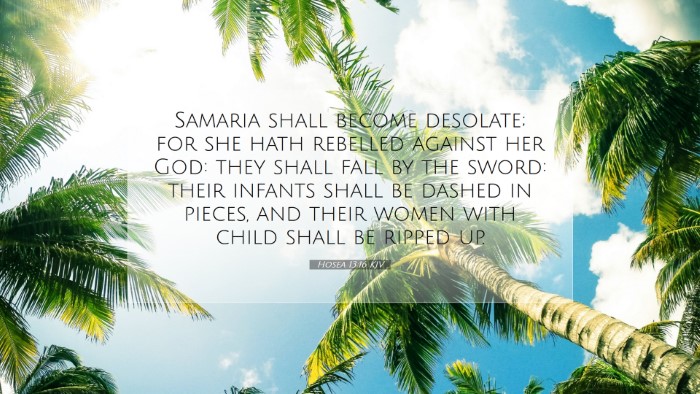Old Testament
Genesis Exodus Leviticus Numbers Deuteronomy Joshua Judges Ruth 1 Samuel 2 Samuel 1 Kings 2 Kings 1 Chronicles 2 Chronicles Ezra Nehemiah Esther Job Psalms Proverbs Ecclesiastes Song of Solomon Isaiah Jeremiah Lamentations Ezekiel Daniel Hosea Joel Amos Obadiah Jonah Micah Nahum Habakkuk Zephaniah Haggai Zechariah MalachiHosea 13:16
Hosea 13:16 KJV
Samaria shall become desolate; for she hath rebelled against her God: they shall fall by the sword: their infants shall be dashed in pieces, and their women with child shall be ripped up.
Hosea 13:16 Bible Commentary
Bible Commentary on Hosea 13:16
Hosea 13:16 reads: "Samaria shall become desolate; for she hath rebelled against her God: they shall fall by the sword; their infants shall be dashed in pieces, and their women with child shall be ripped up." This verse presents a stark and vivid portrayal of the consequences of sin and rebellion against God. In this commentary, we will explore the insights from several public domain commentaries, providing depth for pastors, students, theologians, and Bible scholars.
Contextual Background
The Book of Hosea is set against the backdrop of a tumultuous period in Israel's history. Hosea prophesied during the decline of the Northern Kingdom of Israel, characterized by rampant idolatry and moral decay. His prophetic message is rooted in a deep concern for the spiritual condition of the people and a call to repentance. The dire predictions of judgment in this verse reflect God's justice and the seriousness of their rebellion.
Interpretation of the Verse
The imagery presented in this verse is striking and brutal. The terms used evoke a deep sense of sorrow and tragedy, serving as a testament to the severity of God's judgment upon a rebellious nation. Let us explore key insights drawn from the commentaries:
Judgment on Samaria
Matthew Henry notes that Samaria, as the capital of the Northern Kingdom, represents the heart of Israel's sinfulness. Its rebellion against God is viewed not just as a political failure but a spiritual one, which leads to inevitable destruction.
Albert Barnes emphasizes that the judgment is a result of active rebellion against God. He states that the severe consequences manifest in the desolation of the city, illustrating God's unwavering righteousness in dealing with sin.
The Consequences of Rebellion
The prophetic declaration that "they shall fall by the sword" implies an impending military defeat. Adam Clarke clarifies that this refers not only to death in battle but also to the pervasive violence that comes when a nation turns away from divine authority. The resultant chaos is portrayed through the violent images of infants dashed in pieces and pregnant women subjected to horrific fate.
Henry adds that these graphic depictions serve as warnings. The fate of these innocents underscores the totality of God's judgment that extends not only to the guilty but tragically also touches the most vulnerable segments of society, revealing the deep societal decay that had taken root.
God’s Holiness and Justice
A critical aspect of understanding this verse is the nature of God's holiness. Hosea's message highlights that God’s justice cannot be separated from His holiness. God's relentless demand for righteousness meant that sin would incur severe consequences, as highlighted by Clarke’s commentary on the necessity of punishment in the face of rebellion.
This serves as a moral lesson that extends beyond ancient Israel and remains relevant today: the inherent dangers and dire consequences of turning away from God's commandments.
Theological Implications
The implications of Hosea 13:16 reach into various theological realms, such as:
- Sovereignty of God: The judgment depicted illustrates God's sovereign control over human history and affairs.
- The Nature of Sin: Rebellion manifests itself in both corporate and individual forms, pointing to the need for personal accountability before God.
- Hope and Restoration: While the immediate context is one of judgment, scholars like Barnes ensure that the larger narrative of Hosea also encapsulates themes of hope, urging the possibility of repentance and restoration.
Application for Today
For modern readers, especially those in pastoral or teaching roles, this text serves as a potent reminder of the consequences of forsaking God. It challenges believers to reflect on their lives, communities, and nations, urging vigilance against the slow creep of rebellion against divine authority.
The visceral language utilized presents both a stark warning and a call to action. It invites deeper engagement with issues of justice and morality in contemporary society, encouraging believers to actively pursue righteousness and uphold the values of God’s kingdom.
Conclusion
Hosea 13:16 is a sobering reminder of the reality of judgment against sin. Through the commentary insights of Matthew Henry, Albert Barnes, and Adam Clarke, we are compelled to contemplate the weight of rebellion against God, the seriousness of sin, and the corresponding nature of divine justice. In a world plagued by similar issues, the message of Hosea remains pertinent, exhorting us to fidelity to God amid challenges and societal decay. Thus, the study of such prophetic texts not only enriches our theological understanding but also informs our practical outworking of faith within our modern context.


